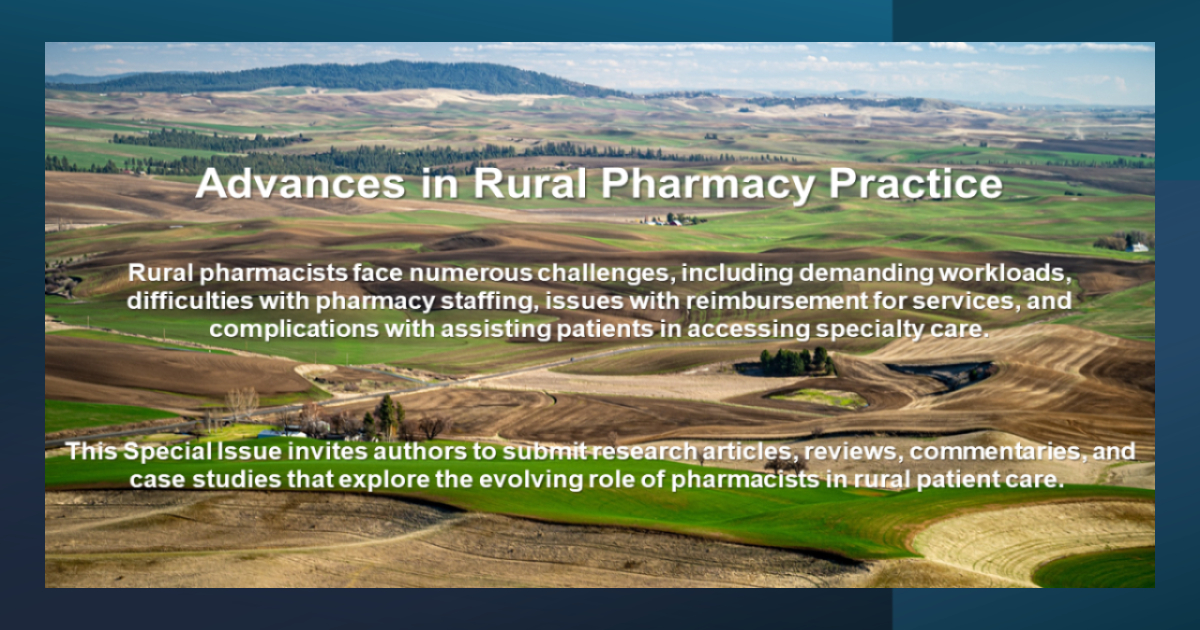Advances in Rural Pharmacy Practice
This special issue belongs to the section “Pharmacy Practice and Practice-Based Research“.
Special Issue Information
Dear Colleagues,
Rural pharmacists face numerous challenges, including demanding workloads, difficulties with pharmacy staffing, issues with reimbursement for services, and complications with assisting patients in accessing specialty care. This Special Issue invites authors to submit research articles, reviews, commentaries, and case studies that explore the evolving role of pharmacists in rural patient care. Suggested topics include but are not limited to:
- Innovative patient care services provided by rural pharmacy personnel in a hospital, community, or ambulatory care setting.
- Novel approaches and activities in pharmacy education that prepare student pharmacists for rural practice.
- Implementation of advanced pharmacy technician roles in rural patient care.
Descriptions of advancements in rural community pharmacy, hospital pharmacy, ambulatory care, and pharmacy education are welcome. Articles describing rural patient care advancements in any country are encouraged for this Special Issue.
I look forward to receiving your contributions.
Prof. Dr. Kimberly McKeirnan
Prof. Dr. Megan Undeberg
Guest Editors
Manuscript Submission Information
Manuscripts should be submitted online at www.mdpi.com by registering and logging in to this website. Once you are registered, click here to go to the submission form. Manuscripts can be submitted until the deadline. All submissions that pass pre-check are peer-reviewed. Accepted papers will be published continuously in the journal (as soon as accepted) and will be listed together on the special issue website. Research articles, review articles as well as short communications are invited. For planned papers, a title and short abstract (about 250 words) can be sent to the Editorial Office for assessment.
Submitted manuscripts should not have been published previously, nor be under consideration for publication elsewhere (except conference proceedings papers). All manuscripts are thoroughly refereed through a single-blind peer-review process. A guide for authors and other relevant information for submission of manuscripts is available on the Instructions for Authors page. Pharmacy is an international peer-reviewed open access semimonthly journal published by MDPI.
Please visit the Instructions for Authors page before submitting a manuscript. The Article Processing Charge (APC) for publication in this open access journal is 1800 CHF (Swiss Francs). Submitted papers should be well formatted and use good English. Authors may use MDPI's English editing service prior to publication or during author revisions.
Keywords
- pharmacy practice research
- rural patient care
- pharmacy education
- advanced roles for pharmacy technicians

Benefits of Publishing in a Special Issue
- Ease of navigation: Grouping papers by topic helps scholars navigate broad scope journals more efficiently.
- Greater discoverability: Special Issues support the reach and impact of scientific research. Articles in Special Issues are more discoverable and cited more frequently.
- Expansion of research network: Special Issues facilitate connections among authors, fostering scientific collaborations.
- External promotion: Articles in Special Issues are often promoted through the journal's social media, increasing their visibility.
- e-Book format: Special Issues with more than 10 articles can be published as dedicated e-books, ensuring wide and rapid dissemination.

